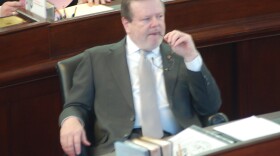State Senators rolled out a $22.9 billion spending plan Tuesday afternoon at the General Assembly. This spending proposal represents an increase of 2.5 percent over the current budget and is a significant step in the protracted budget process.
Senate Leader Phil Berger, a Republican from Rockingham, gave some highlights from his chamber's budget draft during a press conference. As has been the practice for the Senate in recent years, the full budget document is expected to be released late Tuesday.
This budget allocates an additional $600 million for education, $363 million for the state's rainy day fund, and appropriates $150 million for victims of Hurricane Matthew, among hundreds of other line items.
Senate Republicans also are proposing additional changes to the tax code. This draft would lower the individual and corporate tax rates, while increasing the standard deduction. Over a two-year time frame, the plan seeks to reduce the individual rate to 5.35 percent from its current rate of 5.5 percent, and the corporate rate to 2.5 percent, from its present 3 percent level.
Senate majority leader Harry Brown (R-Onslow) is a lead budget writer. He detailed some of the education initiatives in this budget, explaining that it sets aside $24 million for principal raises, and $5 million for assistant principal increases.
"We think the people have better ideas on how to spend their money than bureaucrats and politicians in Raleigh" - Senate Leader Phil Berger
This budget proposes about half of the 5.1 percent growth proposed by Democratic Governor Roy Cooper.
"We share priorities, but not the same spending levels," Berger told a room full of reporters. "I would say the biggest difference is we are more interested I giving back to the taxpayers than the Governor. Our priority is to make sure is that the money stays in the economy. We think the people have better ideas on how to spend their money than bureaucrats and politicians in Raleigh – that's to me the biggest difference in where we are."
The budget does not set aside any money for cost of living adjustments for state retirees. It also does not provide money for the "raise the age" effort which has received renewed support at the legislature in recent weeks. Instead, Senators propose funds to study the issue.
This proposal is a 2.5 percent increase over the budget approved last summer, and amounts to a 3.75 percent increase over actual spending. Those two different figures emerge when there are reversions – money that is appropriated, but not actually spent by various departments and agencies across the state, was not spent. According to Sen. Brown about $270 million that went out, was not spent.
Senators are expected to vet the spending bill during subcommittees on Wednesday morning before it moves on to the full pensions, appropriations, and finance committees later in the day. The full chamber will cast two votes on the fiscal blueprint, expected to be Thursday and Friday.
The passing of a state budget amounts to a legislative marathon. The governor introduced his plan in March. House lawmakers will roll out their plan in the coming weeks, and then the two chambers will negotiate a final compromise.








